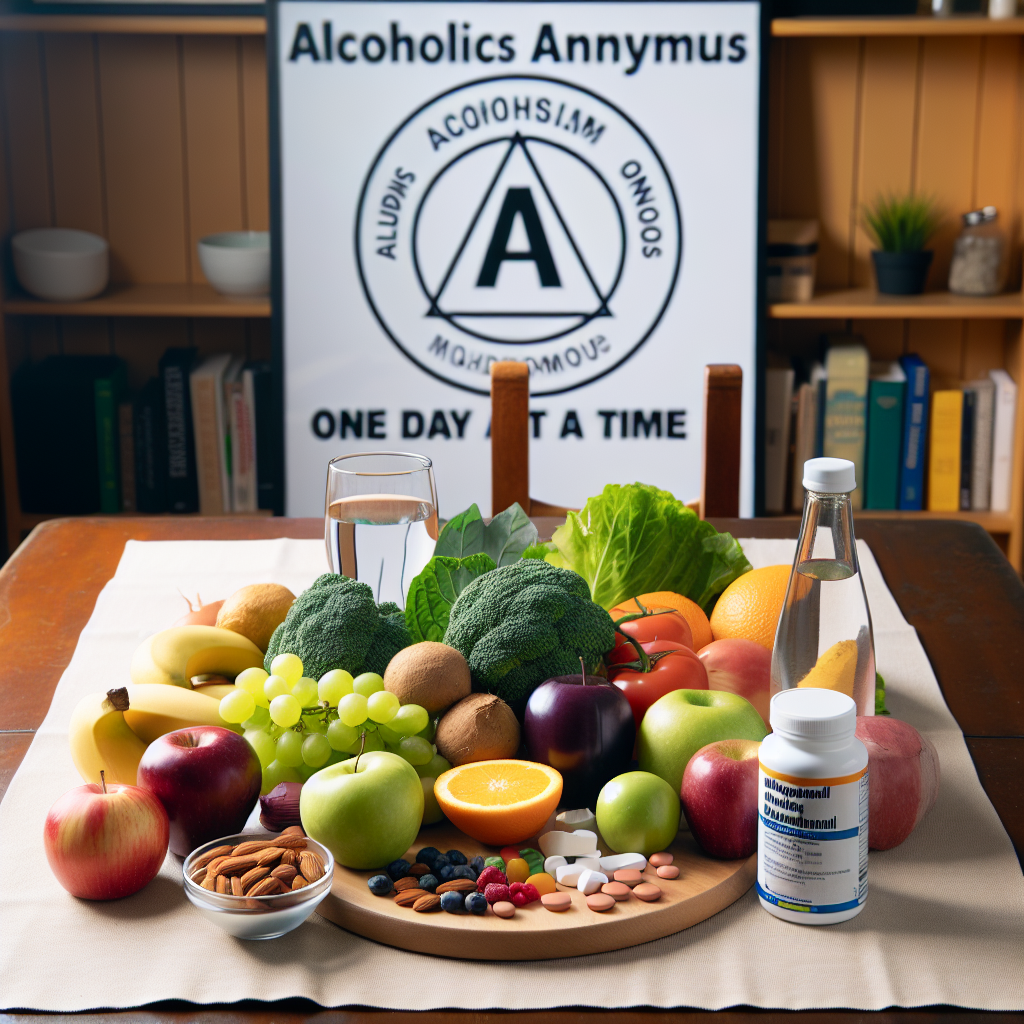-
Table of Contents

“Fueling Recovery: The Vital Role of Nutrition in Overcoming Alcoholism”
Introduction
The Importance of Nutrition in Alcoholism Recovery
Alcoholism is a chronic disease that not only affects an individual’s mental and emotional well-being but also has profound impacts on physical health. One of the critical aspects of recovery from alcoholism is proper nutrition. Alcohol abuse often leads to severe nutritional deficiencies, as it interferes with the body’s ability to absorb and utilize essential nutrients. Moreover, individuals struggling with alcoholism may neglect their diet, leading to further health complications. Adequate nutrition plays a pivotal role in the recovery process by helping to repair the damage caused by alcohol, restoring physical health, and supporting mental and emotional stability. A well-balanced diet can enhance the effectiveness of other treatment modalities, reduce the risk of relapse, and improve overall quality of life for those in recovery. Therefore, integrating nutritional therapy into alcoholism treatment programs is essential for promoting long-term recovery and well-being.
The Role of Balanced Diets in Supporting Alcoholism Recovery
The journey to recovery from alcoholism is a multifaceted process that requires a holistic approach, encompassing not only psychological and emotional support but also physical well-being. One often overlooked yet crucial aspect of this journey is nutrition. A balanced diet plays a pivotal role in supporting alcoholism recovery, offering a foundation upon which individuals can rebuild their health and resilience. Understanding the importance of nutrition in this context can inspire those in recovery to make informed dietary choices that bolster their overall well-being.
Alcoholism wreaks havoc on the body, depleting essential nutrients and impairing the digestive system’s ability to absorb vitamins and minerals. Chronic alcohol consumption can lead to deficiencies in vital nutrients such as thiamine (vitamin B1), folate, vitamin B12, and magnesium, among others. These deficiencies can exacerbate physical and mental health issues, making the recovery process even more challenging. Therefore, replenishing these nutrients through a balanced diet is essential for restoring the body’s natural equilibrium.
Incorporating a variety of nutrient-dense foods into one’s diet can significantly aid in the recovery process. Fresh fruits and vegetables, whole grains, lean proteins, and healthy fats provide the necessary vitamins and minerals that the body needs to heal and function optimally. For instance, leafy greens and citrus fruits are rich in vitamin C, which supports the immune system and aids in the repair of tissues damaged by alcohol. Similarly, whole grains and legumes are excellent sources of B vitamins, which are crucial for energy production and neurological health.
Moreover, a balanced diet can help stabilize blood sugar levels, which is particularly important for individuals recovering from alcoholism. Alcohol can cause significant fluctuations in blood sugar, leading to mood swings, irritability, and cravings. By consuming regular, balanced meals that include complex carbohydrates, proteins, and healthy fats, individuals can maintain steady blood sugar levels, thereby reducing the risk of relapse and improving overall mood and energy levels.
In addition to physical health benefits, proper nutrition can also have a profound impact on mental health. Nutrient-rich foods can enhance brain function, improve mood, and reduce symptoms of anxiety and depression, which are common challenges faced by those in recovery. Omega-3 fatty acids, found in fatty fish, flaxseeds, and walnuts, are known to support brain health and have been linked to reduced symptoms of depression. Similarly, foods rich in antioxidants, such as berries and nuts, can help combat oxidative stress and inflammation, promoting better mental clarity and emotional stability.
Furthermore, adopting a balanced diet can foster a sense of empowerment and control, which is vital for individuals in recovery. Making conscious, healthy food choices can serve as a positive coping mechanism, replacing the destructive habits associated with alcohol consumption. This shift towards mindful eating can also enhance self-esteem and reinforce the commitment to a sober lifestyle.
In conclusion, the role of a balanced diet in supporting alcoholism recovery cannot be overstated. By replenishing essential nutrients, stabilizing blood sugar levels, and promoting both physical and mental health, proper nutrition lays the groundwork for a successful recovery journey. Embracing a nutritious diet not only aids in healing the body but also empowers individuals to take charge of their health and well-being. As such, those in recovery are encouraged to prioritize their nutritional needs, recognizing that every healthy choice brings them one step closer to a brighter, sober future.
Essential Nutrients for Healing and Recovery from Alcoholism
Recovering from alcoholism is a multifaceted journey that requires not only mental and emotional resilience but also a keen focus on physical health. One of the most critical yet often overlooked aspects of this recovery process is nutrition. Proper nutrition plays a pivotal role in healing the body and mind, providing the essential nutrients needed to repair the damage caused by prolonged alcohol abuse. As individuals embark on the path to sobriety, understanding the importance of nutrition can significantly enhance their recovery experience.
Alcoholism often leads to severe nutritional deficiencies, as alcohol interferes with the body’s ability to absorb and utilize essential nutrients. For instance, chronic alcohol consumption can impair the absorption of vitamins such as B1 (thiamine), B6, B12, and folic acid, all of which are crucial for brain function and overall health. Consequently, individuals in recovery may experience symptoms such as fatigue, depression, and cognitive impairments, which can hinder their progress. Therefore, replenishing these vital nutrients is a fundamental step in the healing process.
In addition to vitamins, minerals such as magnesium, zinc, and potassium are often depleted in those struggling with alcoholism. Magnesium, for example, is essential for muscle function, nerve transmission, and energy production. A deficiency in this mineral can lead to muscle cramps, anxiety, and even seizures, making it imperative to restore adequate levels through diet or supplementation. Similarly, zinc plays a crucial role in immune function and wound healing, while potassium is vital for maintaining proper heart and muscle function. Ensuring a balanced intake of these minerals can significantly improve physical well-being and support the body’s recovery efforts.
Moreover, protein is another essential nutrient that should not be overlooked. Proteins are the building blocks of the body, necessary for repairing tissues and producing enzymes and hormones. Alcoholism can lead to muscle wasting and weakened immune function, both of which can be mitigated by consuming adequate amounts of high-quality protein. Lean meats, fish, eggs, and plant-based sources such as beans and lentils can provide the necessary amino acids to aid in the body’s repair and regeneration processes.
Equally important is the role of healthy fats in recovery. Omega-3 fatty acids, found in fish, flaxseeds, and walnuts, have been shown to reduce inflammation and support brain health. Given that alcohol abuse can cause significant inflammation and damage to brain cells, incorporating these healthy fats into the diet can help mitigate some of the adverse effects and promote cognitive recovery. Additionally, healthy fats are essential for hormone production and overall cellular function, further underscoring their importance in the recovery process.
Hydration is another critical component of nutritional recovery. Alcohol is a diuretic, leading to dehydration and the loss of essential electrolytes. Drinking plenty of water and consuming hydrating foods such as fruits and vegetables can help restore fluid balance and support overall health. Proper hydration is essential for detoxification, as it aids the kidneys and liver in flushing out toxins accumulated from alcohol consumption.
In conclusion, the journey to recovery from alcoholism is undoubtedly challenging, but focusing on nutrition can provide a solid foundation for healing and renewal. By replenishing essential vitamins, minerals, proteins, healthy fats, and maintaining proper hydration, individuals can significantly enhance their physical and mental well-being. This holistic approach not only supports the body’s natural healing processes but also empowers individuals to take control of their health, fostering a sense of hope and resilience as they move forward on their path to sobriety.
Q&A
1. **Question:** How does proper nutrition aid in the recovery process for individuals with alcoholism?
**Answer:** Proper nutrition helps repair the body’s damaged tissues, supports liver function, and replenishes essential vitamins and minerals that are often depleted due to excessive alcohol consumption.
2. **Question:** What specific nutrients are crucial for individuals recovering from alcoholism?
**Answer:** Crucial nutrients include B vitamins (especially thiamine, B6, and B12), vitamin C, magnesium, zinc, and amino acids, as they help restore neurological function, boost the immune system, and support overall physical and mental health.
Conclusion
Proper nutrition is crucial in alcoholism recovery as it helps repair the body, restore essential nutrients, and improve overall physical and mental health. Alcohol abuse often leads to malnutrition, vitamin deficiencies, and organ damage, which can hinder the recovery process. A balanced diet rich in vitamins, minerals, and proteins supports the healing of the liver, brain, and other organs affected by alcohol. Additionally, good nutrition can enhance mood, reduce cravings, and increase energy levels, making it easier for individuals to maintain sobriety and improve their quality of life. Therefore, incorporating a comprehensive nutritional plan is a vital component of effective alcoholism recovery programs.



